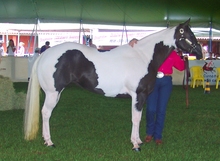Concerns about recent confirmed cases of contagious equine viruses have spurred several organization to postpone APHA-approved shows scheduled for May 9â10. The Arizona Paint Horse Club will postpone its Summer Celebration show in Scottsdale due to confirmed local cases of Vesicular Stomatitis Virus.

Judging paint horse conformation
Concerns about recent confirmed cases of contagious equine viruses have spurred several organization to postpone APHA-approved shows scheduled for May 9â10, 2015.
© 2015 by Avare Reynaldo
The Southwest Washington Paint Horse Club will postpone its Color Palooza show in Albany, Oregon, due to confirmed cases of Equine Herpesvirus-1 in Oregon.
As previously reported, Vesicular Stomatitis Virus (VSV) has been confirmed in two horses in Maricopa County, Arizona. The affected horses seem to be sicker with this outbreak than the small outbreak Arizona saw earlier this year.
As a precaution, the Arizona Paint Horse Club Executive Board voted to postpone the clubâs APHA-approved Summer Celebration show, originally scheduled for May 9â10 in the best interest of the health of exhibitorsâ horses.
As of May 6, APHA has not received word about cancellations due to VSV from any other APHA-approved shows.
According to another May 1, 2015, press release, the New Mexico Livestock Board has confirmed two cases of vesicular stomatitis, detected in horses located in New Mexicoâs Grant and Otero counties. The livestock on those are under quarantine by the New Mexico state veterinarian.
Veterinarians and livestock owners who suspect an animal may have Vesicular Stomatitis or any other vesicular disease should immediately contact State or Federal animal health authorities. Livestock with clinical signs of Vesicular Stomatitis are isolated until they are healed and determined to be of no further threat for disease spread. There are no USDA approved vaccines for Vesicular Stomatitis.
Though very unusual, people can be infected with the virus. In these situations, it is usually among those who handle infected animals (for example while inspecting a horse's mouth and the horse coughs in the person's face, thereby delivering a large dose of virus onto the person's eyes and lips). Vesicular Stomatitis Virus can cause flu-like symptoms and only rarely includes lesions or blisters in people.
According to a May 4 press release from the Oregon Department of Agriculture, four Oregon horses have tested positive for Equine Herpes Virus (EHV-1) with two of the horses showing neurological symptoms.
It was confirmed last week that a Marion County horse had tested positive for EHV-1 and had developed neurological symptoms. The second horse that developed neurological symptoms resided at a stable in Polk County with about 40 other horses and was taken to the Large Animal Hospital at Oregon State Universityâs College of Veterinary Medicine over the weekend.
The Polk County stable has been placed under quarantine and the remaining horses are being monitored by the stable manager and a veterinarian.
In addition to the Polk County stable, two Marion County farms remain under quarantine due to exposure to EHV-1. The infected horses and other horses exposed at the quarantined facilities attended an Oregon High School Equestrian Team (OHSET) meet at the Linn County Fairgrounds on April 16-19.
ODA is currently investigating the potential of any additional exposures at this time. In addition, ODA is working to notify owners of horses that have been potentially exposed and has notified Oregon equine veterinarians.
In light of the recent EHV-1 cases, the Southwest Washington Paint Horse Club has cancelled its May 9â10 Color Palooza show in Albany, Oregon
As of May 6, APHA has not received notice of any other APHA-approved shows or events cancelled due to EHV-1.
As a reminder, Oregon State Veterinarian Dr. Brad LeaMaster advises horse owners to practice strict biosecurity measures and hygiene if they travel to shows and competitions with their animals. Concerned owners should contact their veterinarian if they have questions.
